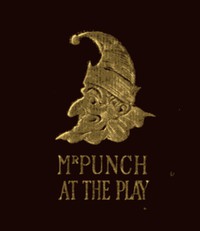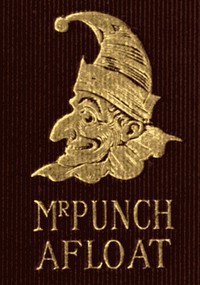Mr. Punch on the Warpath: Humours of the Army, the Navy and the Reserve Forces by - (famous ebook reader TXT) 📗

- Author: -
Book online «Mr. Punch on the Warpath: Humours of the Army, the Navy and the Reserve Forces by - (famous ebook reader TXT) 📗». Author -
9. When being charged by the enemy, go fours about and gallop for all you are worth; it is just as agreeable to be prodded in the back as in the chest, and gives the enemy more satisfaction. To extend, or work to the flanks, might deprive your enemy of useful experience.
10. Never cast your eyes to the direction from which the enemy is not expected, as that is the usual direction of his real attack, and it is not polite to spoil the arrangement of your friend the enemy.
11. Lastly, remember that the best motto for Yeomanry Troopers is "Point de Z�le."
OUR RIFLE VOLUNTEERS A Peace Song (1859)(Composed and volunteered by Mr. Punch)
Some talk of an invasion
As a thing whereat to sneeze,
And say we have no occasion
To guard our shores and seas:
Now, Punch is no alarmist,
Nor is moved by idle fears,
But he sees no harm that we all should arm
As Rifle Volunteers!
[Pg 118]Let sudden foes assail us,
'Tis well we be prepared;
Our Fleet—who knows?—may fail us,
Nor serve our shores to guard.
For self-defence, then, purely,
Good reason there appears,
To have, on land, a force at hand
Of Rifle Volunteers!
To show no wish for fighting,
Our forces we'd increase;
But 'tis our foes by frighting
We best may keep at peace,
For who will dare molest us
When, to buzz about their ears,
All along our coast there swarms a host
Of Rifle Volunteers!
Abroad ill winds are blowing,
Abroad war's vermin swarm;
What may hap there's no knowing,
We may not 'scape the storm.
Athirst for blood, the Eagles
May draw our dove's nest near;
But we'll scare away all birds of prey
With our Rifle Volunteers!
No menace we're intending,
Offence to none we mean,
We arm but for defending
Our country and our Queen!
To British hearts 'tis loyalty
'Tis love her name endears:
Up! then, and form! shield her from harm
Ye Rifle Volunteers!
[Pg 115]
The above is not a war picture. It merely represents an incident in the too realistic scouting manœuvres of the Blankshire Yeomanry. Poor Mr. and Mrs. Timmins thought at least the country had been invaded.
[Pg 117]
De Vœux. "My grandfather, you know, lived till he was ninety-eight."
Trevor Carthew. "Well, my grandmother died at the age of ninety-seven."
Brown. "In my family there are several who are not dead yet!"
[Pg 119]
Small Boys (to Volunteer Major in temporary command). "I say, guv'nor—hi! Just wipe the blood off that 'ere sword!"
[Pg 120]
[Pg 121]
[Pg 122]
Aide-de-Camp (at the review). "What are you doing here, sir? Where's your regiment?"
Party on the Grass. "Shure I don' know. Bu-r I don't rec'nise your 'thority, gov'nour!"
Aide-de-Camp (furious). "What the deuce d'you mean, sir? You're a Volunteer, aren't you?"
Party on the Grass. "(Hic!) Norabirofit!—Was jus' now—bu-r I've reshigned 'n cons'quence—temp'ry indishposition!"
[Pg 123]
Captain. "What's the charge, sergeant?"
Sergeant. "This time it's drunkenness, sir. But this man is the most troublesome fellow in the regiment, sir. He goes out when he likes, and comes in when he likes, and gets drunk when he likes—in fact, he might be a horficer!!"
[Pg 124]
CHAT � LA MODEBrown, Jones, and Robinson, discovered discussing the stats of the Navy in a first-class compartment.
Brown. My dear fellows, I can assure you we are in a terrible condition of unpreparedness. If France was to declare war to-morrow we should be nowhere—absolutely nowhere!
Jones. You mean, of course, with Russia.
Robinson. Or was it Italy?
Brown. It doesn't matter which. I fancy that France alone could tackle us. Why, a man was telling me the other day that if Gibraltar was seized—as it might be—we should not get a ship-load of wood for months—yes, for months!
Jones. But what has Gibraltar to do with it?
Robinson. Why, of course, it guards our approaches to the Suez Canal.
Brown. Oh, that's only a matter of detail. But what we want is a hundred millions to be spent at once. Cobden said so, and I agree with Cobden.
Jones. But upon what?
Robinson. Oh, in supporting the Sultan, and subsidising the Ameer.
Brown. I don't think that sort of thing is of much importance. But if we had a hundred millions (as Mr. Cobden suggested), we might increase our coaling stations, and build new ships, and double the navy, and do all sorts of things.
Jones. But I thought we were fairly well off for coaling stations, had lots of ships on the stocks, and, with the assistance of our merchant marine, an ample supply of good sailors.[Pg 128]
Robinson. That's what all you fellows say! But wait till we have a war, then you will see the fallacy of all your arguments. No, we should buy the entire fleet of the world. There should be no other competitor. Britannia should really rule the waves.
Brown. Yes, yes. Of course; but after all, that is not the important matter. What we want is a hundred millions available to be spent on anything and everything. And it's no use having further discussion because that was Cobden's view of it, and so it is mine.
Jones. Where is it to come from—out of the rates?
Brown and Robinson (together). Certainly not.
Jones. Or the taxes?
Brown and Robinson (as before). Don't be absurd.
Jones. Well, it must come from somewhere! Can you tell me where?
Robinson. Why should we?
Brown. Yes, why should we? Even Cobden didn't go so far as that, and——But, here we are at the station.
[Invasion of porters, and end of the conversation.
[Pg 125]
"I'm afraid Milly and I have put our respective feet in it this time. We thought we would test our capacities at hospital work, and attach ourselves to pa's regiment—of course, without telling pa—and were getting along quite nicely with a soldier who wasn't very well, when we met pa and the General and his regiment. They took away the patient, and judging from pa's looks, there's a warm time coming."
[Pg 126]
The new helmet as ordinarily worn. The same, as worn on motor duty.
Directions:—Simply unhook the lower portion of the helmet; thereby extending the collapsible weather-and dust-proof mask. Admirable also as a disguise.
[Pg 127]
Sergeant of Signallers. "What ai's Murphy to-day? He don't seem able to take in a thing!"
Private Mulvaney. "Shall I signal to 'im, 'Will ye 'ave a drink?'?"
[Pg 129]
Army Candidate. "And I only muffed one thing in the geography paper. Couldn't for the life of me think where the Straits of Macassar were!"
Fond Father. "Oh, I say, you ought to have known that. Fancy—the Straits of Macassar!"
Army Candidate. "Well, I didn't, anyhow. By the way, where are they, dad?"
Fond Father. "Oh—where are they? Oh—er—they're—well, they're—— but don't you think we'd better go to lunch?"
[Pg 130]
Club Wag. "Well, good-night, Admiral."
Warrior. "There's a stupid joke. Admiral! Can't you see my spurs?"
Wag. "Oh, I thought they were your twin screws."
[Pg 131]
Sentry (on the simultaneous approach of two persons). "Who goes there?—two ways at once!"
[Pg 132]
MILITARY DIALOGUES IIArmy Reform
Scene.—The canteen of the Rutlandshire Regiment, at Downboro', an airy, plastered hall with high windows. A bar at one end is backed by a rampart of beer barrels. A double line of barrack tables and benches runs down the room. The hour is 5 p.m. At one of the tables sits Mr. W. Wilson, late Private in the regiment, in all his glory of a new check suit with an aggressive pattern, a crimson tie, a horseshoe pin, an aluminium watch-chain, a grey "bowler" and a buttonhole of violets. Privates W. and G. Smith, P. Brady, E. Dudd and other men of H. company are at the table, or standing near it.
Mr. Wilson (passing round a great tin measure containing beer, after taking a preliminary pull himself). Of course I do 'ear more, being in the smoke, than you 'ear down in this provincial 'ole; and there's[Pg 134] generals and statesmen and such-like comes and stays at our place, and when they gets tied up in a knot over any military question, as often as not they says, "Let's ask Wilson, the under-gardener. 'E's a hex-military man; 'e's a 'ighly intellergent feller"; and I generally gets them out of their difficulty.
Pte. W. Smith. D'ye know anything about this army reform?
Mr. Wilson (with lofty scorn). Do I know anything about it?
Pte. G. Smith. D'ye think they're going to make a good job of it?
Mr. Wilson. Naaw. And why? Becos they're goin' the wrong wai to work. They're arskin the opinion of perfeshernal hexperts and other sich ignoramuses, and ain't goin' to the fountain 'ead. Oo's the backbone of the English service?
Pte. P. Brady. The Oirish private.
Mr. Wilson. Right you are, my 'Ibernian—always subsitooting British for Hirish—and the British compiny is the finest horganisation in the world. Give the private a free 'and and a rise of pay, and make the compiny the model of the[Pg 136] army, and then yer can put all the hexperts and all the Ryle Commissions and their reports to bed.
Pte. Dudd. As how?
Mr. Wilson. As 'ow, yer old thick head? It's as plain as a pike-staff. Taike this question of responsibility. When some one comes a bloomer, and the paipers all rise 'ell, the civilian toff, 'oos a sort of a commander-in-chief in a Sunday coat and a chimney-pot 'at, 'e says, "It ain't me. Arsk the real commander-in-chief," and the feeld-marshal 'e says, "Arsk the hadjutant-general," and the hadjutant-general, 'e says, "Arsk the hordnance bloke." Now in the compiny there ain't none of that. If the colonel goin' round at kit inspection finds the beds badly made up, or jags and sight-protectors deficient, or 'oles in the men's socks, 'e goes fierce for the captin' and threatens to stop 'is leave; and the captin' don't say, "Oh, it's the hadjutant, or the quarter-master, or the chaplain what's to blame," no, 'e gives the subalterns and the coloured-sergeant beans, and they slip it in to the sergeants and corprils in charge of squads, and the beds is set up straight, and the men put down[Pg 138] for jags and sight-protectors, and the 'oles in the socks is mended.
Pte. W. Smith. That's so, old pal. What else would you recermend?
Mr. Wilson (reaching out for the measure). Thank yer. This 'ere army-reforming's a dry job. Now as to the metherd of attack. When the regiment goes out field-firing the henemy's a line of hearthenware pots, touched up on the sly by the markers with a dash of white; the captains count the telergraph posts up the range and give the exact distance; and the men goes 'opping along in line like crows on a ploughed field, the sergeantes a-naggin' 'em about the 'Ithe position and the coprils calling them back to pick up empty cartridge cases. Is that the wai, that you, George Smith, and you, Bill, and you, Pat, used ter creep up to the rabbit warrens when we used ter go out in the herly morning to assist the farmers to keep down the ground gime—poaching the colonel called it? No, we hexecuted wide turning movements and never showed no more than the tip of a nose. Let





Comments (0)